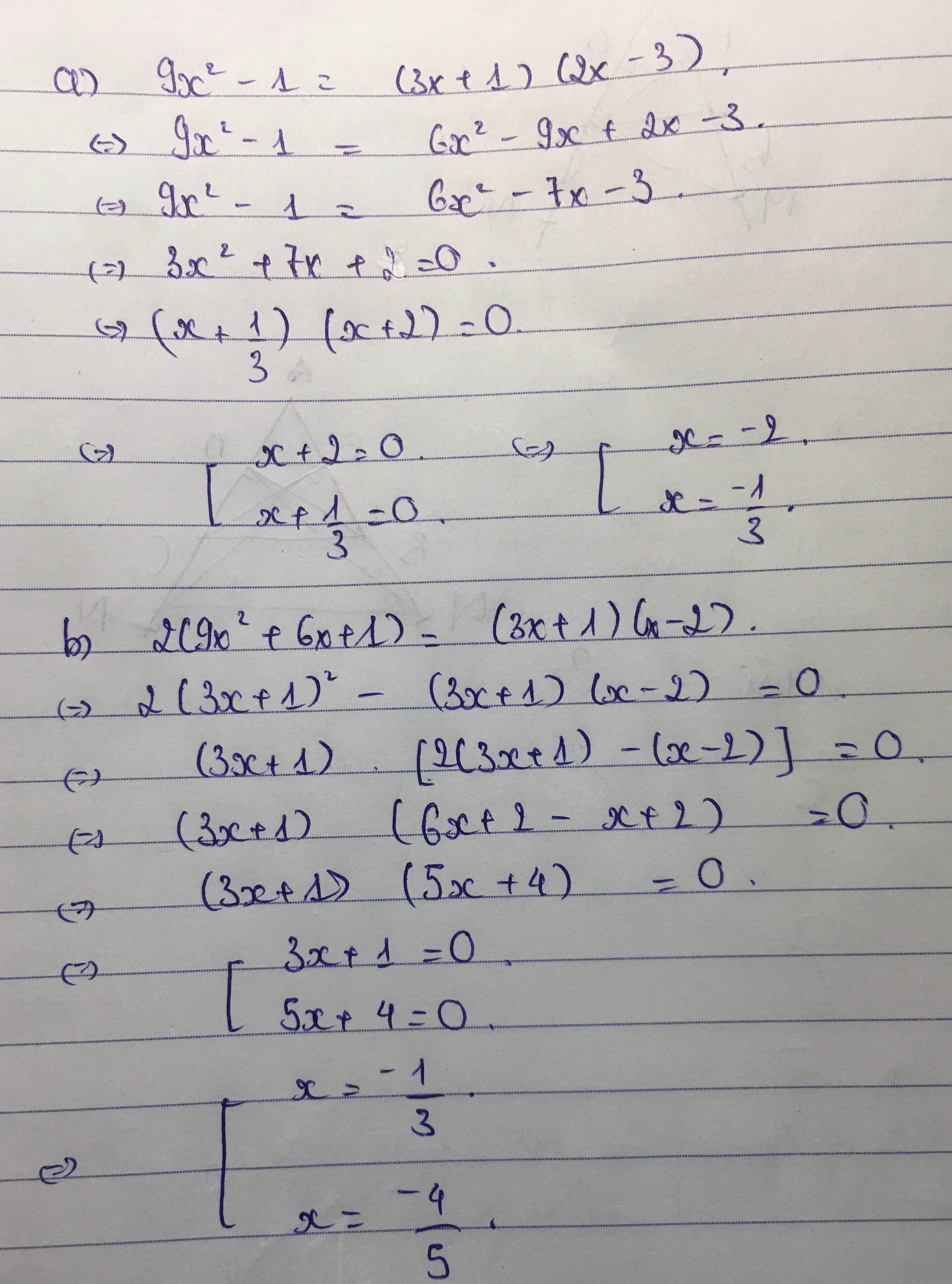Giải giúp em với
(x+2)|x^3-3x|=x^6+9x^2+2x

Những câu hỏi liên quan
a) 9x^2 - 1 = (3x + 1)(2x - 3)
b) 2(9x^2 + 6x + 1) = (3x + 1) (x - 2)
mng giải giúp em 2 câu này vs ạ, em cảm ơn <3
a: =>(3x+1)(3x-1)-(3x+1)(2x-3)=0
=>(3x+1)(3x-1-2x+3)=0
=>(3x+1)(x+2)=0
=>x=-1/3 hoặc x=-2
b: =>(3x+1)(6x+2)-(3x+1)(x-2)=0
=>(3x+1)(6x+2-x+2)=0
=>(3x+1)(5x+4)=0
=>x=-1/3 hoặc x=-4/5
Đúng 0
Bình luận (0)
Rút gọn biểu thức sau: a, 9x +3x.(2x^2 +x - 3) b, A=(3x - 1)^2- 9x (x+1) c, A=(x-1)^2 - x (x+1) giúp em với ạ, em cảm ơn trước
a, \(9x+3x\left(2x^2+x-3\right)=9x+6x^3+3x^2-9x\)
b, \(\left(3x-1\right)^2-9x\left(x+1\right)=9x^2-6x+1-9x^2-9x=1-15x\)
c, \(\left(x-1\right)^2-x\left(x+1\right)=x^2-2x+1-x^2-x=1-3x\)
Đúng 1
Bình luận (0)
1.Giải phương trình:
a) 4x-8/2x^2+1 = 0
b)x^2-x-6/x-3 = 0
c)x+5/3x-6 - 1/2 = 2x-3/2x-4
d)12/1-9x^2 = 1-3x/1+3x - 1+3x/1-3x
2.Giải các phương trình:
a)5 + 96/x^2-16 = 2x-1/x+4 - 3x-1/4-x
b)3x+2/3x-2 - 6/2+3x = 9x^2/9x^2-4
c)x+1/x^2+x+1 - x-1/x^2-x+1 = 3/x(x^4+x^2+1)
Bài 1.
\( a)\dfrac{{4x - 8}}{{2{x^2} + 1}} = 0 (x \in \mathbb{R})\\ \Leftrightarrow 4x - 8 = 0\\ \Leftrightarrow 4x = 8\\ \Leftrightarrow x = 2\left( {tm} \right)\\ b)\dfrac{{{x^2} - x - 6}}{{x - 3}} = 0\left( {x \ne 3} \right)\\ \Leftrightarrow \dfrac{{{x^2} + 2x - 3x - 6}}{{x - 3}} = 0\\ \Leftrightarrow \dfrac{{x\left( {x + 2} \right) - 3\left( {x + 2} \right)}}{{x - 3}} = 0\\ \Leftrightarrow \dfrac{{\left( {x + 2} \right)\left( {x - 3} \right)}}{{x - 3}} = 0\\ \Leftrightarrow x - 2 = 0\\ \Leftrightarrow x = 2\left( {tm} \right) \)
Bài 2.
\(c)\dfrac{{x + 5}}{{3x - 6}} - \dfrac{1}{2} = \dfrac{{2x - 3}}{{2x - 4}}\)
ĐK: \(x\ne2\)
\( Pt \Leftrightarrow \dfrac{{x + 5}}{{3x - 6}} - \dfrac{{2x - 3}}{{2x - 4}} = \dfrac{1}{2}\\ \Leftrightarrow \dfrac{{x + 5}}{{3\left( {x - 2} \right)}} - \dfrac{{2x - 3}}{{2\left( {x - 2} \right)}} = \dfrac{1}{2}\\ \Leftrightarrow \dfrac{{2\left( {x + 5} \right) - 3\left( {2x - 3} \right)}}{{6\left( {x - 2} \right)}} = \dfrac{1}{2}\\ \Leftrightarrow \dfrac{{ - 4x + 19}}{{6\left( {x - 2} \right)}} = \dfrac{1}{2}\\ \Leftrightarrow 2\left( { - 4x + 19} \right) = 6\left( {x - 2} \right)\\ \Leftrightarrow - 8x + 38 = 6x - 12\\ \Leftrightarrow - 14x = - 50\\ \Leftrightarrow x = \dfrac{{27}}{5}\left( {tm} \right)\\ d)\dfrac{{12}}{{1 - 9{x^2}}} = \dfrac{{1 - 3x}}{{1 + 3x}} - \dfrac{{1 + 3x}}{{1 - 3x}} \)
ĐK: \(x \ne -\dfrac{1}{3};x \ne \dfrac{1}{3}\)
\( Pt \Leftrightarrow \dfrac{{12}}{{1 - 9{x^2}}} - \dfrac{{1 - 3x}}{{1 + 3x}} - \dfrac{{1 + 3x}}{{1 - 3x}} = 0\\ \Leftrightarrow \dfrac{{12}}{{\left( {1 - 3x} \right)\left( {1 + 3x} \right)}} - \dfrac{{1 - 3x}}{{1 + 3x}} - \dfrac{{1 + 3x}}{{1 - 3x}} = 0\\ \Leftrightarrow \dfrac{{12 - {{\left( {1 - 3x} \right)}^2} - {{\left( {1 + 3x} \right)}^2}}}{{\left( {1 - 3x} \right)\left( {1 + 3x} \right)}} = 0\\ \Leftrightarrow \dfrac{{12 + 12x}}{{\left( {1 - 3x} \right)\left( {1 + 3x} \right)}} = 0\\ \Leftrightarrow 12 + 12x = 0\\ \Leftrightarrow 12x = - 12\\ \Leftrightarrow x = - 1\left( {tm} \right) \)
Bài 2.
\(a)5 + \dfrac{{96}}{{{x^2} - 16}} = \dfrac{{2x - 1}}{{x + 4}} - \dfrac{{3x - 1}}{{4 - x}}\)
ĐK: \(x\ne\pm4\)
\( Pt \Leftrightarrow \dfrac{{96}}{{\left( {x - 4} \right)\left( {x + 4} \right)}} - \dfrac{{2x - 1}}{{x + 4}} - \dfrac{{3x - 1}}{{x - 4}} = - 5\\ \Leftrightarrow \dfrac{{96 - \left( {2x - 1} \right)\left( {x - 4} \right) - \left( {3x - 1} \right)\left( {x + 4} \right)}}{{\left( {x - 4} \right)\left( {x + 4} \right)}} = - 5\\ \Leftrightarrow \dfrac{{ - 5{x^2} - 2x + 96}}{{\left( {x - 4} \right)\left( {x + 4} \right)}} = - 5\\ \Leftrightarrow - 5{x^2} - 2x + 96 = - 5\left( {{x^2} - 16} \right)\\ \Leftrightarrow 96 - 2x = 80\\ \Leftrightarrow - 2x = - 16\\ \Leftrightarrow x = 8\left( {tm} \right)\\ b)\dfrac{{3x + 2}}{{3x - 2}} - \dfrac{6}{{2 + 3x}} = \dfrac{{9{x^2}}}{{9{x^2} - 4}} \)
ĐK: \(x \ne \dfrac{2}{3};x \ne -\dfrac{2}{3}\)
\( Pt \Leftrightarrow \dfrac{{3x + 2}}{{3x - 2}} - \dfrac{6}{{2 + 3x}} - \dfrac{{9{x^2}}}{{9{x^2} - 4}} = 0\\ \Leftrightarrow \dfrac{{{{\left( {2 + 3x} \right)}^2} - 6\left( {3x - 2} \right) - 9{x^2}}}{{\left( {3x - 2} \right)\left( {2 + 3x} \right)}} = 0\\ \Leftrightarrow \dfrac{{16 - 6x}}{{\left( {3 - 2x} \right)\left( {2 + 3x} \right)}} = 0\\ \Leftrightarrow 16 - 6x = 0\\ \Leftrightarrow - 6x = - 16\\ \Leftrightarrow x = \dfrac{8}{3}\left( {tm} \right)\\ c)\dfrac{{x + 1}}{{{x^2} + x + 1}} - \dfrac{{x - 1}}{{{x^2} - x + 1}} = \dfrac{3}{{x\left( {{x^4} + {x^2} + 1} \right)}} \)
Ta có: \(x(x^4+x^2+1)=x[(x^2+1)^2-x^2]=x(x^2+x+1)(x^2-x+1)\)
Do \(\left\{ \begin{array}{l} {x^2} + x + 1 = {\left( {x + \dfrac{1}{2}} \right)^2} + \dfrac{3}{4} > 0\forall x\\ {x^2} - x + 1 = \left( {x - \dfrac{1}{2}} \right) + \dfrac{3}{4} > 0\forall x \end{array} \right.\) nên phương trình xác định với mọi $x \ne 0$
Quy đồng, rồi biến đổi phương trình về dạng \(2x=3 \Leftrightarrow x =\dfrac{3}{2} (tm)\)
Cho đa thức: P(x) = x^5 - 2x^3 + 3x^4 - 9x^2 + 11x - 3 và Q(x) = 3x^4 = x^5 - 2x^3 - 11 - 10x^2 + 9x
Biết rằng G(x) = 2x^2 + Q(x) = P(x). Tìm đa thức G(x).
- Các bạn giải giúp mình với nhé!
Lấy P(x) - Q(x) -2x^2 thì ra G(x) nhé
giải phương trình 1)dfrac{1-6x}{x-2}+dfrac{9x+4}{x+2}dfrac{xleft(3x-2right)+1}{x^2-4}2) dfrac{3x+2}{3x-2}-dfrac{6}{2+3x}dfrac{9x^2}{9x^2-4}3) dfrac{x+5}{3x-6}-dfrac{1}{2}dfrac{2x-3}{2x-4}4) dfrac{x-1}{x}+dfrac{1}{x+1}dfrac{2x-1}{2x^2+2}5) dfrac{2}{x+1}+dfrac{3x+1}{x+1}dfrac{1}{left(x+1right)left(x-2right)}
Đọc tiếp
giải phương trình 1)\(\dfrac{1-6x}{x-2}+\dfrac{9x+4}{x+2}=\dfrac{x\left(3x-2\right)+1}{x^2-4}\)2) \(\dfrac{3x+2}{3x-2}-\dfrac{6}{2+3x}=\dfrac{9x^2}{9x^2-4}\)3) \(\dfrac{x+5}{3x-6}-\dfrac{1}{2}=\dfrac{2x-3}{2x-4}\)4) \(\dfrac{x-1}{x}+\dfrac{1}{x+1}=\dfrac{2x-1}{2x^2+2}\)5) \(\dfrac{2}{x+1}+\dfrac{3x+1}{x+1}=\dfrac{1}{\left(x+1\right)\left(x-2\right)}\)
giúp mình với ạ câu nào cũng được
Đúng 0
Bình luận (0)
Giải phương trình:
1> 12-2(1-x)2=3x-2=2x-3
2> 10x+3-5x=4x+12
3> 11x+42-2x=100-9x-22
4> 2x-(3-5x)=4(x+3)
5> 2(x-3)+5x(x-1)=5x2
6> -6(1,5-2x)=3(-15+2x)
7> 14x-(2x+7)=3x+(12x-13)
8> (x-4)(x+4)-2(3x-2)=(x-4)2
9> 4(x-2)-(x-3)(2x-5)
giải giúp mik với ạ
a, \(12-2\left(1-x\right)^2=\left(3x-2\right)\left(2x-3\right)\)
\(< =>12-2\left(1-2x+x^2\right)=6x^2-9x-4x+6\)
\(< =>12-2+4x-2x^2=6x^2-13x+6\)
\(< =>10+4x-2x^2-6x^2+13x-6=0\)
\(< =>-8x^2+17x+4=0< =>\orbr{\begin{cases}x=\frac{17-\sqrt{417}}{16}\\x=\frac{17+\sqrt{417}}{16}\end{cases}}\)
b, \(10x+3-5x=4x+12< =>5x+3-4x-12=0\)
\(< =>x-9=0< =>x=9\)
c, \(11x+42-2x=100-9x-22< =>9x+42-100+9x+22=0\)
\(< =>18x+64-100=0< =>18x-36=0< =>x=\frac{36}{18}=2\)
d, \(2x-\left(3-5x\right)=4\left(x+3\right)< =>2x-3+5x=4x+12\)
\(< =>7x-3-4x-12=0< =>3x-15=0< =>x=\frac{15}{3}=5\)
e, \(2\left(x-3\right)+5x\left(x-1\right)=5x^2< =>2x-6+5x^2-5=5x^2\)
\(< =>2x-11+5x^2-5x^2=0< =>2x-11=0< =>x=\frac{11}{2}\)
f, \(-6\left(1,5-2x\right)=3\left(-15+2x\right)< =>-6\left(\frac{3}{2}-2x\right)=3\left(2x-15\right)\)
\(< =>-9+12x-6x+45=0< =>6x+36=0< =>x=-6\)
g, \(14x-\left(2x+7\right)=3x+12x-13< =>14x-2x-7=15x-13\)
\(< =>12x-7-15x+13=0< =>-3x+6=0< =>x=-2\)
h, \(\left(x-4\right)\left(x+4\right)-2\left(3x-2\right)=\left(x-4\right)^2\)
\(< =>x^2-16-6x+4=x^2-8x+16\)
\(< =>x^2-6x-12-x^2+8x-16=0\)
\(< =>2x-28=0< =>x=\frac{28}{2}=14\)
q, \(4\left(x-2\right)-\left(x-3\right)\left(2x-5\right)=?\)thiếu đề
a,4x-8/2x^2+1=0 b,x^2-x-6/x-3=0 c,x+5/3x-6-1/2=2x-3/2x-4 d,12/1-9x^2=1-3x/1+3x-1+3x/1-3x
ai giúp với huhu ;-;
Giải pt:
a) \(\sqrt{2x^2-3}\)=\(\sqrt{4x-3}\)
b) \(\sqrt{2x-1}\)=\(\sqrt{x-1}\)
c) \(\sqrt{x^2-x-6}\)=\(\sqrt{x-3}\)
d) \(\sqrt{x^2-x}\)=\(\sqrt{3x-5}\)
Giúp em với, anh thịnh giúp em xíu á
a, \(\sqrt{2x^2-3}=\sqrt{4x-3}\) (x \(\ge\) \(\sqrt{\dfrac{3}{2}}\))
Vì hai vế ko âm, bp 2 vế ta được:
2x2 - 3 = 4x - 3
\(\Leftrightarrow\) 2x2 = 4x
\(\Leftrightarrow\) x2 = 2x
\(\Leftrightarrow\) x2 - 2x = 0
\(\Leftrightarrow\) x(x - 2) = 0
\(\Leftrightarrow\) \(\left[{}\begin{matrix}x=0\\x-2=0\end{matrix}\right.\Leftrightarrow\left[{}\begin{matrix}x=0\left(KTM\right)\\x=2\left(TM\right)\end{matrix}\right.\)
Vậy S = {2}
b, \(\sqrt{2x-1}=\sqrt{x-1}\) (x \(\ge\) 1)
Vì hai vế ko âm, bp 2 vế ta được:
2x - 1 = x - 1
\(\Leftrightarrow\) x = 0 (KTM)
Vậy x = \(\varnothing\)
c, \(\sqrt{x^2-x-6}=\sqrt{x-3}\) (x \(\ge\) 3)
Vì hai vế ko âm, bp 2 vế ta được:
x2 - x - 6 = x - 3
\(\Leftrightarrow\) x2 - 2x - 3 = 0
\(\Leftrightarrow\) x2 - 3x + x - 3 = 0
\(\Leftrightarrow\) x(x - 3) + (x - 3) = 0
\(\Leftrightarrow\) (x - 3)(x + 1) = 0
\(\Leftrightarrow\) \(\left[{}\begin{matrix}x-3=0\\x+1=0\end{matrix}\right.\Leftrightarrow\left[{}\begin{matrix}x=3\left(TM\right)\\x=-1\left(KTM\right)\end{matrix}\right.\)
Vậy S = {3}
d, \(\sqrt{x^2-x}=\sqrt{3x-5}\) (x \(\ge\) \(\dfrac{5}{3}\))
Vì hai vế ko âm, bp 2 vế ta được:
x2 - x = 3x - 5
\(\Leftrightarrow\) x2 - 4x + 5 = 0
\(\Leftrightarrow\) x2 - 4x + 4 + 1 = 0
\(\Leftrightarrow\) (x - 2)2 + 1 = 0
Vì (x - 2)2 \(\ge\) 0 với mọi x \(\ge\) \(\dfrac{5}{3}\) \(\Rightarrow\) (x - 2)2 + 1 > 0 với mọi x \(\ge\) \(\dfrac{5}{3}\)
\(\Rightarrow\) Pt vô nghiệm
Vậy S = \(\varnothing\)
Chúc bn học tốt!
Đúng 2
Bình luận (2)
Bài 1: Giải phương trình:
a) (2x + 3)2 - 3 (x - 4) (x + 4)= (x - 2)2 + 1
b) (3x - 2) (9x2 + 6x + 4) - (3x - 1) (9x2 - 3x + 1) = x - 4
c) x (x - 1) - (x - 3) (x + 4) = 5x
d) (2x + 1) (2x - 1) = 4x (x - 7) - 3x
Mng giúp Bơ nhaaa
Camon và hứa trả công ạaa
a) \(\left(2x+3\right)^2-3\left(x-4\right)\left(x+4\right)=\left(x-2\right)^2+1\)
\(\Leftrightarrow4x^2+12x+9-3\left(x^2-16\right)=x^2-4x+4+1\)
\(\Leftrightarrow4x^2+12x+9-3x^2+48=x^2-4x+5\)
\(\Leftrightarrow x^2+12x+57=x^2-4x+5\)
\(\Leftrightarrow16x+52=0\)
\(\Leftrightarrow x=-\frac{13}{4}\)
b) \(\left(3x-2\right)\left(9x^2+6x+4\right)-\left(3x-1\right)\left(9x^2-3x+1\right)=x-4\)
\(\Leftrightarrow\)Xem lại đề !
c) \(x\left(x-1\right)-\left(x-3\right)\left(x+4\right)=5x\)
\(\Leftrightarrow x^2-x-x^2-x+12=5x\)
\(\Leftrightarrow-2x+12=5x\)
\(\Leftrightarrow7x-12=0\)
\(\Leftrightarrow x=\frac{12}{7}\)
d) \(\left(2x+1\right)\left(2x-1\right)=4x\left(x-7\right)-3x\)
\(\Leftrightarrow4x^2-1=4x^2-28x-3x\)
\(\Leftrightarrow28x+3x-1=0\)
\(\Leftrightarrow31x-1=0\)
\(\Leftrightarrow x=\frac{1}{31}\)
a) (2x + 3)2 - 3 (x - 4) (x + 4)= (x - 2)2 + 1
<=> 4x^2 + 12x + 9 - 3(x^2 - 16) = x^2 - 4x + 4 + 1
<=> 4x^2 + 12x + 9 - 3x^2 + 48 = x^2 - 4x + 5
<=> x^2 + 12x + 57 = x^2 - 4x + 5
<=> x^2 - x^2 + 12x + 4x + 57 - 5 = 0
<=> 16x + 52 = 0
<=> 16x = -52
<=> x = -13/4
























